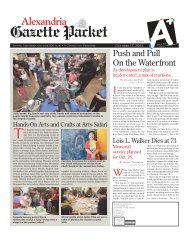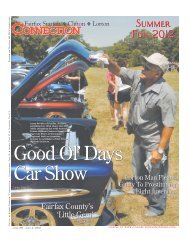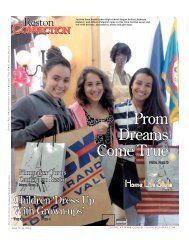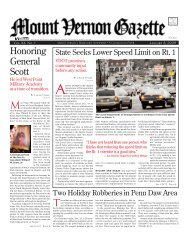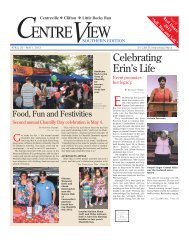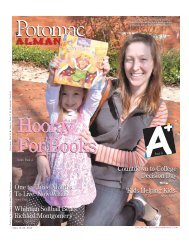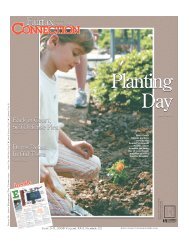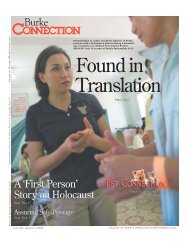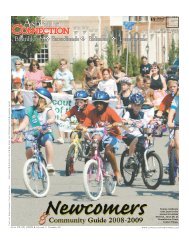Herndon - The Connection Newspapers
Herndon - The Connection Newspapers
Herndon - The Connection Newspapers
Create successful ePaper yourself
Turn your PDF publications into a flip-book with our unique Google optimized e-Paper software.
Crews continue to<br />
use a huge bright<br />
yellow horizontal<br />
crane to build the<br />
bridges for rail<br />
from Route 7 to the<br />
median of the<br />
Dulles International<br />
Airport Access<br />
Highway/Dulles Toll<br />
Road. This work is<br />
expected to be<br />
completed in July.<br />
Photo by<br />
Chuck Samuelson/<br />
Dulles Corridor<br />
Metrorail Project<br />
www.<strong>Connection</strong><strong>Newspapers</strong>.com<br />
News<br />
<strong>Herndon</strong> <strong>Connection</strong> Editor Kemal Kurspahic<br />
703-778-9414 or herndon@connectionnewspapers.com<br />
A Decision Time for Silver Line<br />
Deadline approaches for<br />
Loudoun County Board<br />
vote on extending the rail<br />
into county.<br />
By Nicholas M. Horrock<br />
<strong>The</strong> <strong>Connection</strong><br />
Whoever coined the quip “like herding<br />
cats,” must have had in mind the financing<br />
of the Dulles Rail Project. It<br />
requires getting consensus from two<br />
county boards of supervisors, Fairfax and Loudoun,<br />
the Federal government, the Virginia government and<br />
therefore the governor and state legislature and the<br />
Washington Metropolitan Airport Authority.<br />
<strong>The</strong> project’s course, so far, brings to mind another<br />
quip; “the perils of Pauline.” From an argument over<br />
a tunnel under Tysons Corner to disputes about underground<br />
facilities at Dulles Airport, the project has<br />
slipped from one crisis to another. Even if the rail<br />
project’s second phase were to go smoothly from here<br />
on out, it will take as long to build the 23 mile metro<br />
line as it took to build the Transcontinental Railroad.<br />
However, the word “smoothly” does not seem applicable<br />
since the most recent “peril” is the Loudoun<br />
County Board of Supervisors.<br />
In the 2011 elections, Republican candidates won<br />
every seat on the board in a voter rejection of the<br />
spendthrift actions of their predecessors.<br />
THE NEW BOARD has approached the funding<br />
question with suspicion, but must make a decision<br />
to opt in or out of the project by July 4. If the board<br />
supports the project, the county will have to pay some<br />
$270 million in construction costs and $11 million a<br />
year to help finance Metro’s operating costs.<br />
<strong>The</strong> members have met several times over the past<br />
few months trying, without success, to find methods<br />
to fund the county’s share.<br />
<strong>The</strong> board has set one more meeting before the<br />
fourth.<br />
Vice Chairman Janet Clark (R-Blue Ridge) wrote a<br />
letter to her constituents on June 7 setting out her<br />
concerns. She said although the line’s extension was<br />
considered for years, the “prior boards merely en-<br />
dorsed the concept of rail to Loudoun, they did nothing<br />
to establish a means for paying for it.”<br />
She said the original concept was that the rail line<br />
would be paid for by federal dollars and state funds,<br />
but now there are no federal dollars and Virginia’s<br />
one time contribution of $150 million will only be<br />
enough to “buy down the Dulles Toll Road/267 tolls<br />
for two years,” she said. Some 54 percent of the funding<br />
must now come from Dulles Toll Road revenue,<br />
she said. <strong>The</strong> tolls, which will grow astronomically<br />
as the costs of the rail grow, are considered a tax on<br />
the people of Loudoun. <strong>The</strong>re is a lawsuit in federal<br />
court that may threaten the tolls as a funding source<br />
for the metro. <strong>The</strong> class action suit challenged<br />
MWAA’s authority to level taxes under Virginia law<br />
and may be decided later this year.<br />
Clark writes the Silver Line Metro won’t be running<br />
until 2017 so the county will have to build the<br />
stations before the revenue from station parking begins.<br />
Clark warned her constituents that there could be<br />
tax districts formed in the rail areas and “possibly a<br />
county-wide tax on commercial and industrial properties.”<br />
In some incorporated towns, she said, there<br />
could be three levels of tax, a development “that<br />
could put some of our small businesses out of business.”<br />
On Tuesday Clarke and two other board members<br />
said they wanted an extension of the deadline until<br />
December, but BOS chairman Scott York (R-At large)<br />
said there would be no extension and the decision<br />
must be made on July 4.<br />
At this juncture, people who followed the debate<br />
believe that there are four members of the nine member<br />
board in favor of the Silver Line and four members<br />
against. Board member Suzanne Volpe of the<br />
Algonkian District, a Republican, is reportedly uncommitted.<br />
Volpe is a resident of Sterling, Va. <strong>The</strong><br />
vote is so unclear, however, that nobody wanted to<br />
be quoted guessing the outcome.<br />
AS THE DEADLINE NEARS, there is growing ire<br />
on either side of the debate. Right wing groups have<br />
attacked the Silver Line project as a tax. According<br />
to the Washington Post, a group funded by the Koch<br />
brothers, a pair of conservative Kansas billionaires,<br />
have conducted robbo calls in the county saying that<br />
See Board, Page 9<br />
U.S. Marshal for the Eastern District of Virginia<br />
Bobby Mathieson, Executive Director of the Northern<br />
Virginia Regional Gang Task Force Ray Colgan, Congressman<br />
Frank Wolf, Falls Church City Police Chief<br />
Harry Reitze, Leesburg Police Chief Joseph Price, FBI<br />
Special Agent in Charge Ronald Hosko, and U.S.<br />
Attorney for the Eastern District of Virginia Neil<br />
MacBride attended the ceremony June 22, in which a<br />
check for $850,000 was presented to the Northern<br />
Virginia Regional Gang Task Force from the Department<br />
of Justice Assets Forfeiture Fund.<br />
Gang Task Force<br />
Receives $850,000<br />
<strong>The</strong> fight against gang<br />
activity in Northern<br />
Virginia received a<br />
financial boost last week in<br />
the form of an $850,000<br />
check from the Department of<br />
Justice Assets Forfeiture Fund.<br />
U.S. Marshal for the Eastern<br />
District of Virginia Bobby<br />
Mathieson presented the<br />
check to Ray Colgan, executive<br />
director of the Northern<br />
Virginia Regional Gang Task<br />
Force. <strong>The</strong> raid of an illegal<br />
gambling operation in Falls<br />
Church in August 2011 led to<br />
criminal asset forfeiture of<br />
more than $1 million.<br />
<strong>The</strong> Northern Virginia<br />
Regional Gang Task Force is a<br />
multi-jurisdictional partnership<br />
of local, state and federal<br />
law enforcement agencies that<br />
address gang activity in<br />
Northern Virginia through<br />
dedicated officers and resources,<br />
thereby making the<br />
region inhospitable to gang<br />
activity.<br />
<strong>The</strong> funds received last<br />
week will be used for expenses<br />
such as a tattoo<br />
removal program, car leases,<br />
police overtime, equipment<br />
and training.<br />
U.S. Rep. Frank Wolf (R-10)<br />
attended the presentation and<br />
spoke about his appreciation<br />
for the hard work of law<br />
enforcement officers on the<br />
task force and how their<br />
efforts have made the community<br />
a much safer place.<br />
<strong>The</strong> Department of Justice<br />
Asset Forfeiture Program<br />
encompasses the seizure and<br />
forfeiture of assets that<br />
represent the proceeds of, or<br />
were used to facilitate, federal<br />
crimes. <strong>The</strong> primary mission<br />
of the program is to employ<br />
asset forfeiture powers in a<br />
manner that enhances public<br />
safety and security. This is<br />
accomplished by removing the<br />
proceeds of crime and other<br />
assets relied upon by criminals<br />
and their associates to<br />
perpetuate their criminal<br />
activity against society. Asset<br />
forfeiture has the power to<br />
disrupt or dismantle criminal<br />
organizations that would<br />
continue to function if we<br />
only convicted and incarcerated<br />
specific individuals.<br />
Law enforcement equitable<br />
sharing payments, such as the<br />
one made to the task force<br />
last week, are paid to state<br />
and local law enforcement<br />
agencies for assistance in<br />
forfeiture cases. Equitable<br />
sharing payments are calculated<br />
using the degree of<br />
direct participation in law<br />
enforcement efforts resulting<br />
in forfeiture.<br />
Oak Hill/<strong>Herndon</strong> <strong>Connection</strong> ❖ June 27 - July 3, 2012 ❖ 3<br />
Photo Contributed



